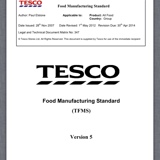Information
-
Document No.
-
Audit Title
-
Client / Site
-
Conducted on
-
Prepared by
-
Location
-
Personnel
24.1 - QUALITY MANAGEMENT SYSTEM AUDITS (BASE)
-
Internal audits of the quality system must verify whether activities comply with the documented procedures, policies and work instructions to ensure food safety, legality and quality are maintained. Audits must also evaluate the effectiveness of the procedures.
-
All elements must be audited at a defined frequency (minimum annually)
24.2 - INTERNAL AUDITS (BASE)
-
As a minimum internal audits must include:
-
The HACCP plan and CCP's
-
All aspects of the prerequisite programme
-
Good manufacturing practises (where not included as prerequisites)
-
Allergen controls
-
Process controls
-
Cleaning (to include an inspection during the main cleaning operation)
-
Site fabrication
-
Traceability
-
Employment agency
-
Recall plan / incident management
-
Off site storage of raw materials / packaging / finished product
24.2.1 - INTERNAL AUDITS (ASPIRATIONAL)
-
All 35 sections of the TFMS are audited.
-
The audits are scheduled throughout the whole year.
24.3 - AUDIT SCHEDULE (BASE)
-
Audits must be scheduled throughout the production year and the scope and frequency of each one established.
-
Audits must be completed to schedule
24.3.1 - AUDIT SCHEDULE (ASPIRATIONAL)
-
The audit schedule is based on a risk assessment
-
Some sections will be scheduled more than once per year.
24.4 - AUDITORS (BASE)
-
Audits must be conducted by trained auditors with experience of the processes or area being assessed
24.4.1 - AUDITORS (ASPIRATIONAL)
-
Auditors are independent of the area being audited, but have good knowledge of the process and area
-
WGLL - Auditors have a good understanding of TFMS and ideally have attended a TFMS training course
24.5 - AUDIT RECORDS (BASE)
-
Written records of audits results must be available
-
Audit reports must detail non-conformance and recommendations - these must be brought to the attention of the person responsible for the activity audited.
24.5.1 - AUDIT RECORDS (ASPIRATIONAL)
-
Evidence of all documentation used or seen is recorded or copied and retained with the audit.
24.6 - CORRECTIVE ACTIONS (BASE)
-
Timescales and corrective actions must be agreed by both parties
-
The completion of corrective actions within agreed timescales must be verified
-
WGLL - the timescales are appropriate to the food safety risk
24.7 - CORRECTIVE ACTIONS (BASE)
-
A non-conformance log must be maintained detailing all non-conformances and used to manage corrective action completion and trend analysis
24.8 - AUDIT TREND ANALYSIS (ASPIRATIONAL)
-
Audit trend analysis takes place where possible (eg GMP and Foreign body audits)
-
Results are used as KPI's for the business, highlighting trends and areas where improvement is necessary
-
WGLL - sites within a group consider sharing learnings
24.9 - THIRD PARTY / TESCO AUDITS (BASE)
-
Agreed corrective actions arising from audits conducted by third parties / Tesco must be implemented in agreed timescales and verified.














